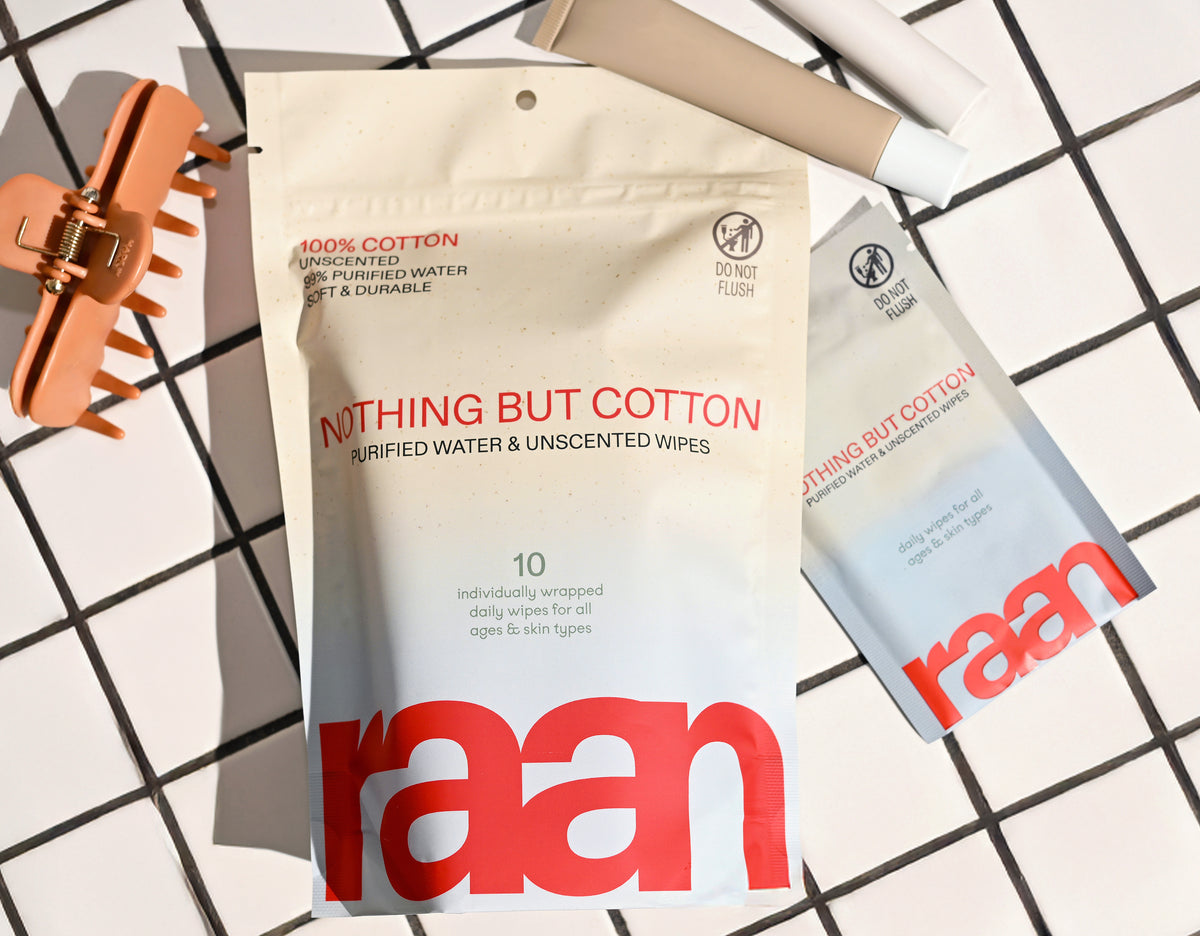Key Takeaways
- CVS baby wipes are designed for versatile use, suitable for diaper changes, quick cleanups, and gentle skin care.
- These wipes are intended for all ages, from infants to adults needing convenient freshness.
- CVS baby wipes provide decent ingredient transparency and hypoallergenic formulations.
- They are made with conventional materials and preservative systems.
- For families seeking cleaner, safer options, unbleached cotton wipes with EWG-verified ingredients are recommended.
Table of Contents
- What Are CVS Baby Wipes? (The Honest Overview)
- Inside the Package, CVS Baby Wipes Ingredients & Materials Decoded
- Every Type of CVS Baby Wipe (And Which One's Right for You)
- Are CVS Baby Wipes Safe for Newborns and Sensitive Skin?
- How to Choose the Right CVS Baby Wipe for Your Family (Practical Guide)
- CVS vs. Other Baby Wipes: Real-World Comparison (Safety, Feel, Integrity)
- Ingredient-by-Ingredient: What Each CVS Baby Wipe Ingredient Does (and Doesn't Do)
- Everyday Use, Safe, Effective Ways to Use CVS Baby Wipes Beyond Diaper Duty
- CVS Baby Wipes for Eco- and Health-Conscious Shoppers: What to Look For
CVS Baby Wipes, Everything You Need to Know for Cleaner, Safer Care
CVS baby wipes are multi-purpose cleaning cloths designed for diaper changes, quick cleanups, and gentle skin care. Despite the "baby" label, these wipes serve families across all ages, from new moms managing spit-up to adults needing on-the-go freshening. Unbleached, 100% cotton baby wipes for sensitive skin are an excellent alternative for those seeking a cleaner, safer option.
The "baby" designation indicates milder formulations and hypoallergenic testing, but it doesn't limit their functionality. Parents use them for sticky fingers after snacks, caregivers rely on them for face cleaning, and adults keep travel packs for gym sessions or commutes. For convenient on-the-go freshness, individually wrapped cotton pocket wipes are a smart addition to your bag.
Five everyday messes solved by wipes: diaper blowouts, food-covered hands, makeup touch-ups, pet paw cleaning, and car interior spills. The convenience factor makes them household essentials, but understanding what's inside matters for long-term skin health.
Inside the Package, CVS Baby Wipes Ingredients & Materials Decoded
CVS baby wipes typically contain purified water (often 99%), aloe vera, vitamin E, and plant-based cleaning agents. The preservative system usually includes phenoxyethanol and caprylyl glycol, not food-grade like some premium alternatives, but generally recognized as safe for topical use.
The substrate material varies by product line. CVS Ultra-Soft uses a blend of plant-based and synthetic fibers, while their Pure Water line emphasizes minimal processing. What you won't find: alcohol, parabens, phthalates, or latex in most formulations.
| CVS Wipe Type | Key Ingredients | Material Base | Preservatives |
|---|---|---|---|
| Ultra-Soft | Water, aloe, vitamin E | Plant/synthetic blend | Phenoxyethanol |
| Pure Water | 99% water, minimal additives | Plant-based fibers | Sodium benzoate |
| Natural | Water, organic aloe, chamomile | Plant-derived | Natural preservative blend |
Every Type of CVS Baby Wipe (And Which One's Right for You)

CVS offers several baby wipe formulations, each targeting specific needs and sensitivities.
CVS Ultra-Soft - Everyday Reliability
Best for: Daily diaper changes and general cleanup
Thicker texture with good durability. Contains aloe and vitamin E for skin conditioning. Available in fragrance-free and lightly scented options.
CVS Pure Water - Minimal Formula
Best for: Newborns and extremely sensitive skin
99% purified water with minimal additives. Thinner than Ultra-Soft but gentler on reactive skin. Limited scent and preservative exposure.
CVS Natural - Plant-Based Care
Best for: Eco-conscious families wanting familiar ingredients
Features organic aloe and chamomile extracts. Plant-derived substrate with biodegradable claims, though disposal reality varies by municipal systems.
Travel formats include resealable single packs and slim 20-count packages. Value packs offer 6-8 refill packs for home use. For families who want a ready-to-go solution for any mess, the mess-ready pack is a practical choice.
Are CVS Baby Wipes Safe for Newborns and Sensitive Skin?
CVS baby wipes undergo hypoallergenic testing and are generally safe for newborn use, particularly the Pure Water line. Dermatologist-tested claims appear on most packaging, indicating basic skin compatibility studies.
For newborns, pediatricians often recommend waiting until after the first few weeks before introducing any wipes. The Pure Water formula offers the lowest risk profile with minimal ingredients and gentle preservation.
Certification status: CVS wipes lack third-party certifications like EWG Verified, which provides independent ingredient safety verification. They rely on internal testing and FDA cosmetic regulations.
- Hypoallergenic formulations
- Alcohol and paraben-free
- Gentle pH balance
- Dermatologist testing
If irritation occurs: Discontinue use immediately, rinse affected area with water, and consult your pediatrician. Patch testing on a small skin area before full use helps identify sensitivities.
How to Choose the Right CVS Baby Wipe for Your Family (Practical Guide)
Step 1: Assess skin sensitivity. If your baby has eczema or reactive skin, start with Pure Water. For typical skin, Ultra-Soft provides good balance of gentleness and durability.
Step 2: Consider daily usage. Heavy diaper duty requires thicker wipes like Ultra-Soft. Light touch-ups and face cleaning work well with thinner Pure Water formulas.
Step 3: Evaluate ingredients carefully. Fragrance-free doesn't always mean preservative-free. Check the full ingredient list for known irritants specific to your family's sensitivities.
Common mistakes to avoid: Assuming all "baby" wipes are identical, not reading ingredient lists, buying bulk quantities before testing skin compatibility.
CVS vs. Other Baby Wipes: Real-World Comparison (Safety, Feel, Integrity)

When comparing CVS baby wipes to alternatives, ingredient transparency and material composition become key differentiators. CVS provides clear ingredient lists and offers fragrance-free options across most product lines. However, their wipes typically contain conventional preservatives rather than food-grade alternatives, and material composition often includes synthetic fibers alongside plant-based ones.
Price-wise, CVS wipes offer solid value, especially during frequent sales promotions. Their cost per wipe generally falls below premium brands while maintaining reasonable quality. However, they lack third-party certifications like EWG Verified status that some health-conscious parents prioritize. If you're looking for a starter bundle of clean, cotton-based wipes, the starter set is worth considering.
| Feature | CVS Ultra-Soft | WaterWipes | Honest Sensitive | Raan Cotton Wipes |
|---|---|---|---|---|
| Material | Plant-fiber blend | Viscose blend | Plant-based | 100% unbleached cotton |
| Preservatives | Phenoxyethanol | Benzalkonium chloride | Phenoxyethanol | Food-grade only |
| Third-party Certified | No | No | No | EWG Verified |
| Plastic Content | Some synthetic fibers | Synthetic blend | Minimal | Zero plastic fibers |
Ingredient-by-Ingredient: What Each CVS Baby Wipe Ingredient Does (and Doesn't Do)
Purified Water makes up 99% of most CVS baby wipes, providing hydration and serving as the delivery system for other ingredients. This high water content explains why these wipes feel refreshing rather than sticky or filmy on skin.
Aloe Vera offers genuine soothing properties backed by research. It helps calm minor skin irritation and provides light moisture. However, it's not a miracle ingredient, it simply reduces the drying effect that cleaning can have on delicate skin.
Vitamin E acts as a mild antioxidant and skin conditioner. In wipe formulations, it primarily prevents the other ingredients from breaking down and provides a silky feel during use.
Glycerin and plant-based emollients create the smooth glide that makes wiping comfortable rather than rough. They also help maintain skin's moisture barrier during cleaning.
Preservatives in CVS wipes typically include phenoxyethanol or similar compounds. These prevent bacterial and mold growth in the moist environment. While not food-grade like some premium alternatives, they're considered safe for topical use at the concentrations used. For more on ingredient safety and regulations, see this FDA resource on disposable wipes.
Everyday Use, Safe, Effective Ways to Use CVS Baby Wipes Beyond Diaper Duty
CVS baby wipes excel at hand and face cleaning for both kids and adults. Their gentle formulation makes them ideal for removing sticky residue, light makeup, or general grime when soap isn't available. The high water content means they won't leave a filmy residue like some adult wet wipes. For more tips and comparisons, see our guide to the best baby wipes for sensitive skin.
For household cleaning, these wipes handle light dusting, quick surface cleanups, and removing fingerprints from screens or mirrors. However, they're not disinfectants, they clean but don't kill germs like sanitizing wipes.
Safe usage techniques: Use gentle, patting motions rather than aggressive scrubbing. For faces, wipe from clean areas toward dirtier ones to avoid spreading bacteria. Never flush wipes down toilets, they don't break down like toilet paper and can cause plumbing issues.
Storage solutions: Keep packs sealed tightly after each use. If wipes dry out, add one tablespoon of filtered water to the pack, distribute by gently kneading the package, then reseal immediately.
- Travel companion: Individual packs for car glove compartments and diaper bags
- Pet care: Safe for cleaning paws and fur (avoid eyes and mouth areas)
- Exercise cleanup: Post-workout face and hand refreshing when showers aren't available
- Kitchen helper: Quick cleanup of sticky spills and messy hands during cooking
For a broader look at how CVS wipes compare to other major brands, check out our review of Huggies baby wipes.
If you're interested in the science behind disposable wipes and their impact on skin, this clinical review on baby wipes and skin health is a helpful resource.
CVS Baby Wipes for Eco- and Health-Conscious Shoppers: What to Look For

CVS offers plant-based fiber options in their Natural line, though these aren't 100% biodegradable in typical landfill conditions. The packaging uses standard plastic materials with some recyclable components, but specific post-consumer waste percentages aren't clearly disclosed on most varieties.
For ingredient transparency, CVS provides complete ingredient lists on packaging and online. Their fragrance-free varieties avoid synthetic fragrances, and most lines exclude parabens, phthalates, and latex. Still, if you're seeking wipes with zero plastic fibers, unbleached 100% cotton, and EWG-verified ingredients, there are alternatives that offer greater transparency and simplicity.
- Look for: Full ingredient lists, clear material disclosures, and third-party certifications when possible.
- Avoid: Vague "eco-friendly" claims without supporting details, and always check for plastic fiber content if that's a concern.
For families who want a wipe that's truly minimal, safe for sensitive skin, and built with integrity, Raan's 100% cotton wipes are a straightforward choice.
Frequently Asked Questions
Are CVS baby wipes safe for newborns and individuals with sensitive skin?
CVS baby wipes are formulated to be hypoallergenic and mild, making them generally safe for newborns and sensitive skin. However, they use conventional materials and preservatives, so families with very sensitive skin may prefer wipes with simpler, verified ingredients for extra peace of mind.
What ingredients are commonly found in CVS baby wipes, and are there any harmful chemicals to be aware of?
CVS baby wipes typically contain water, preservatives like phenoxyethanol or parabens, and synthetic fibers. While these ingredients are approved for use, they include conventional preservatives and plastic fibers that some families prefer to avoid in favor of more transparent, natural options.
How do CVS baby wipes compare to unbleached cotton wipes with EWG-verified ingredients in terms of safety and ingredient transparency?
CVS baby wipes offer decent transparency but rely on conventional materials and preservatives, including plastic fibers. Unbleached cotton wipes with EWG-verified ingredients provide a cleaner, more transparent alternative by using natural fibers and minimal, food-grade preservatives, reducing exposure to unnecessary chemicals.
What are the different types of CVS baby wipes available, and how do I choose the right one for my family's needs?
CVS offers a variety of baby wipes, including fragrance-free, sensitive skin formulas, and wipes with added moisturizers. Choosing the right one depends on your family's skin sensitivity, ingredient preferences, and intended use, whether for diaper changes, quick cleanups, or on-the-go freshness.





